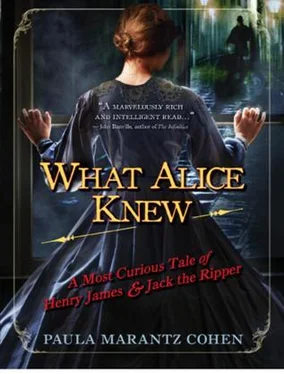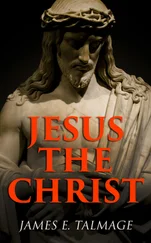job was. I gave the lady no time to
squeal. How can they catch me now.
I love my work and want to start
again. You will soon hear of me
with my funny little games. I
saved some of the proper red stuff in
a ginger beer bottle over the last job
to write with but it went thick
like glue and I cant use it. Red
ink is fit enough I hope ha. ha.
The next job I do I shall clip
the lady’s ears off and send to the
police officers just for jolly wouldn’t
you. Keep this letter back till I
do a bit more work then give
it out straight. My knife’s so nice
and sharp I want to get to work
right away if I get a chance.
Good luck.
Yours truly
Jack the Ripper
Don’t mind me giving the trade name.
And at a right angle to the note was written at the bottom:
wasn’t good enough
to post this before
I got all the red
ink off my hands
curse it.
No luck yet. They
say I’m a doctor
now ha ha.
“The reference to Leather Apron is to a criminal with that nickname who was associated with the murders but has since been cleared,” explained William. “It’s a reference that warrants additional looking into,” he noted, more to himself than to the others.
Alice glanced through the remaining sheets. “Here’s the postcard that they printed in the papers,” she said, holding it up so William could see what she was referring to, and then peering at it more closely. It read:
I wasn’t codding
dear old Boss when
I gave you the tip.
Youll hear about
saucy Jackys work
tomorrow double
event this time
number one squealed
a bit couldn’t
finish straight
off. had not time
to get ears for
police thanks for
keeping last letter
back till I got
to work again.
Jack the Ripper.
William again provided the commentary. “That was also sent to Central News and was postmarked October 1. The reference is to the double murder of September 30. Elizabeth Stride, throat cut, but no further violence done her, followed a few hours later by the extensive stabbings to Catherine Eddowes. It is true that one of the latter’s ears was partially severed, suggesting that the murderer was attempting to follow his intention in the former letter.”
Alice had taken up a third letter on a larger sheet and scrutinized it, with Henry leaning over her shoulder.
From hell,
Mr. Lusk
Sor
I send you half the
Kidne I took from one women
prasarved it for you tother piece I
fried and ate it was very nise I
may send you the bloody knif that
took it out if you only wate a whil
longer
signed Catch me when
you can
Mishter Lusk
“The man certainly could use a spelling primer,” noted Henry. “Who is this Mishter Lusk?”
“Mr. George Lusk,” explained William, “president of the community’s Vigilance Committee, whose assistance to the police the murderer was apparently very proud to thwart. The letter was received only a few days ago, along with a small parcel containing half of a left kidney. Catherine Eddowes’s left kidney was indeed missing. There is no proof, given the timing of these letters, that they could not have been written based on newspaper accounts, hearsay, or even presence near the scene upon the discovery of the bodies. The organ too could have been obtained from another source. Still, the handwriting in these letters shows marks of similarity which, though hardly definitive, are noteworthy.”
“I see no consistency in the misspellings and punctuation,” noted Alice. “It looks like someone making up the mistakes as he goes along.”
William nodded. “They’re erratic, extravagant sorts of mistakes: ‘sor’ for ‘sir’; ‘knif’ for ‘knife.’ He drops the e but keeps the silent k . It’s what I call ‘disingenuous illiteracy,’ the spelling and syntax errors of someone who knows language but wants to appear ignorant.”
Alice had been fingering the letters ruminatively. “This one is on good vellum,” she noted. “Is there a stationer’s mark?”
“What?” asked William.
“The imprint that they put on stationery of a particular brand. It’s not readily perceptible, but held to the light, you can see it.”
William looked interested, if slightly annoyed. “I don’t know that either Abberline or I took note of that. It would be hard to trace a piece of vellum in London.”
“That depends on the quality. And certainly, if it’s good quality, it would help locate the killer as someone who circulates outside the East End.” She held the paper up to the light on her bed table and pointed to a mark that read “Pirie and Sons.” “It would be worth finding out how much of this paper they sell and the nature of their clientele. And if you had a suspect, you could check to see if his other correspondence comes from this particular stationer.”
“Good point,” said William, a touch sheepishly. “Are you going to illuminate anything else?”
“It seems interesting that the pens are different colors.”
“As the first letter said, he tried to use blood but substituted red ink instead.”
“True, but this ink on the postcard appears to be purple or brown. More than one colored ink was used, it would seem.”
“Part of the fantastic nature of the creature,” said William.
“Yes, but the inks themselves. Where did he get them?”
“I don’t believe that they’re hard to find.”
“But not in a cheap stationer’s.”
“It supports my theory that the man is not a poor illiterate,” said William a bit smugly. “I’ve already suggested as much. The handwriting, even when it seems to be primitive, is too good. And the spelling seems too mannered in its inaccuracy to be genuine.”
“Hmm,” said Alice. “What’s this?”
“What?” William asked. He had begun to feel defensive in the face of his sister’s astute observations.
“This mark near the bottom.”
“I noted that.” William nodded. “Abberline and I assume that it’s glue. It’s clear and shiny, slightly raised. It might suggest that the writer is in one of the trades, a cobbler or furniture maker, for example.”
“Possibly,” said Alice. “And this?” She pointed to a smudge on another letter.
“It looks like dried blood,” said Henry, leaning closer.
“Does dried blood look this way?” Alice asked William, assuming that, with his years of medical training, he could validate this fact.
He paused. “Not really. I made a note to look into it. The police assume it’s blood, given the context, but blood generally dries darker. But if it’s not blood, I don’t know what it is.”
“If it’s not blood, then what it is, is interesting,” said Alice a bit sharply. “I should like to study the letters this evening.”
“I don’t think so,” said William, taking them from her, replacing them in the envelope, and putting them back in his pocket.
“Were you planning to look at them tonight yourself?”
“No, not tonight. I have an appointment with Professor Sidgwick of Cambridge University.”
Читать дальше












